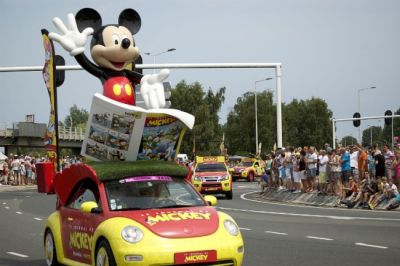
Pic credit: Wikimedia Commons
There's been considerable interest in the news that the Mickey Mouse copyright is due to expire in the USA. According to Global Toy News "the copyright that has prevented others from using Mickey Mouse on their products and media runs out in 2024...you and the rest of the world can begin using the world's most recognised rodent without getting permission or paying licence."
But...
Unlike Mickey himself, it's not all black and white. A second news report claims that in January 2024, the copyright in the first story that featured Mickey Mouse will expire. But, like so many of us, Mickey Mouse (or Mr Mouse as we should probably now call him given his age) has evolved over time and that muddies the water. Film news publication, Screen Rant, says that 'Mickey Mouse's ongoing evolution throughout Disney's history from that very first short film complicates his copyright status.'
The US authorities love Mickey
The US authorities have been kind to Disney. Screen Rant explains that "the copyright was due to expire in 1983 ...in order to protect Disney animated movies, Congress passed a new copyright act that protected works for 50 years after the death of the author, resetting the expiry date to 2003. In 1997, a new regulation was passed, extending Disney's Mickey Mouse copyright once again."
Let's consider the IP in more detail
Two different fields of IP law are relevant here, copyright and trade marks.
Copyright
Copyright law is broad - it can provide legal protection to a wide range of "works" (outputs in modern-speak) such as artistic works (drawings, paintings and more mundane things like corporate logos), written works (more likely to be some corporate drivel than Hemingway), sound recordings, films and computer programmes.
In the USA, Mickey Mouse is protected as an artistic work. In the USA copyright is registered with the authorities. But in many countries, including South Africa, copyright is not registered, and the protection arises automatically - to avoid any confusion I should point out that in South Africa there is a specific provision for the registration of copyright in films, but this registration doesn't actually create the copyright. In South Africa, the copyright term is 50 years calculated from the time of death of the creator or, in some cases, from the date of its public release.
Trade marks
An artistic work like Mickey Mouse can, in addition to copyright protection, also be registered as a trade mark for specified goods/services, provided that there is an intention to use it in relation to such goods or services. Not only can the artwork be registered, it should be registered in order to obtain exclusivity. A real benefit of a trade mark registration is that it can be renewed indefinitely.
THE TRADE MARK STORY - PORSCHE
A recent decision of the EU IP Office ("EUIPO") dealt with another well-known brand, Porsche. The company filed an application to register the sound of a Porsche as a trade mark.
Slick delivery
Based on the submissions that were made, someone at Porsche certainly has a way with words. The sound of a Porsche was described as being "futuristic' and "melodious". With a "certain tempo". With "motives and dynamics". The sound "combines the typical features of a musical composition, namely dynamics structure and different pitches, and brings them together to create a memorable and unusual sound."
It gets even better! The sound of a Porsche is up there with the "opening motif of Beethoven's 5th Symphony, the sound of KITT's scanner from the Knight Rider television series, or the sound of the Lightsabres from the Star Wars film series".
Respect Mr Wordsmith!
Bureaucrats
Unfortunately, Porsche overlooked who it was dealing with. The EUIPO described what had been submitted as a sound that "imitates the sound of an internal combustion engine accelerating until it reaches the desired speed". It said that "the fact that the vehicles themselves do not produce that sound may be known to consumers, but in no way gives them the ability to distinguish the application's goods and services from similar ones offered by other companies."
In other words - some sounds may possibly act as trade marks...but this isn't one of them!
Is there no romance left in this world?
OVERLAPPING RIGHTS
There is considerable overlap between copyright law and trade mark law. Many things that qualify for copyright protection - such as artworks, stylised versions of words or letters, logos, and sounds – may also qualify for trade mark protection. So, is it best to rely on copyright or trade mark protection?
The benefit of copyright protection is that in countries where there is no provision for copyright registration, acquiring protection involves no cost. However, proving ownership and infringement can be tricky. Many of the things that might qualify for copyright protection, visual creations (artworks), stylised versions of words even letters, logos, and sounds will qualify for trade mark protection too. Trade marks can, of course, be registered which does come at a cost, but it provides a degree of certainty. In our view trade mark registration should be sought wherever possible!
The content of this article is intended to provide a general guide to the subject matter. Specialist advice should be sought about your specific circumstances.

